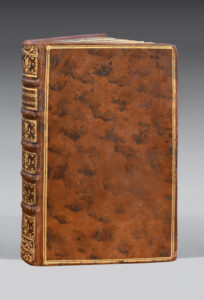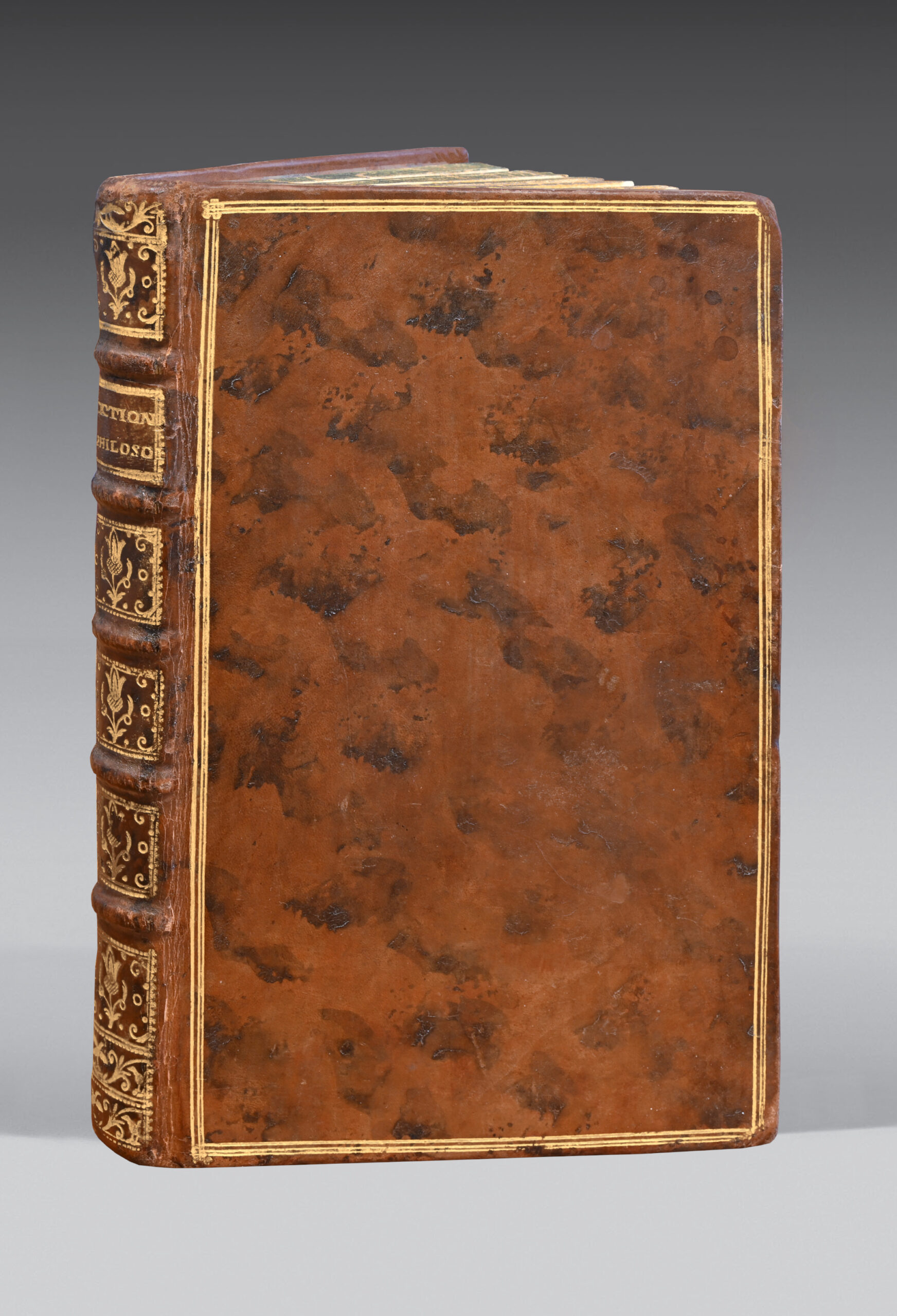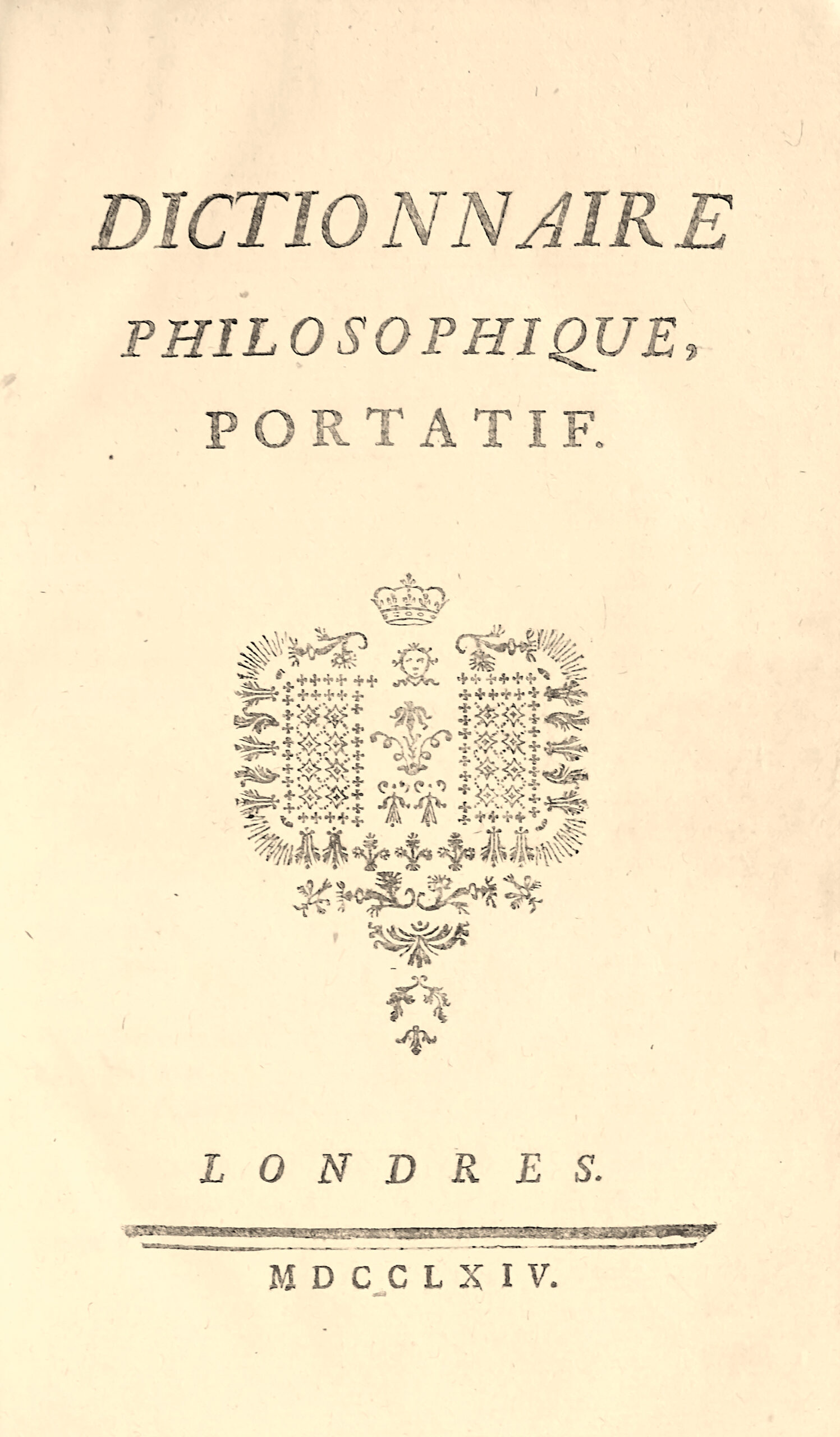London (Geneva), 1764.
8vo of viii pp. (for the half-title, the title and the Table of articles) and 344 pp.
Marbled fawn calf, triple gilt fillet around the covers, finely decorated ribbed spine, painted edges, slight rubbing. Contemporary binding.
186 x 110 mm.
Extremely rare first edition of one of the greatest texts of the Age of Enlightenment, Voltaire’s master-book for “crushing the infamous”.
“Voltaire’s ‘Dictionnaire philosophique’, burnt in Geneva by the hand of the executioner on 26 September 1764 (Gaberel, Voltaire et les Génevois, Paris, 1857, p. 116), was condemned by the Paris Parliament on 19 March and by a decree of the Court of Rome on 8 July 1765 (see Index librorum prohibitorum, Modoetiae, 1850, p. 118). – We know that in 1766, during the execution of the Chevalier de La Barre, the Dictionnaire philosophique, which had been found in his library, was delivered to the flames along with the mutilated remains of the unfortunate Chevalier’. (Bengesco, Bibliographie des Œuvres de Voltaire).
It was in 1763 that Voltaire returned to his idea of a work that would condense the essence of his philosophical, moral, political and religious ideas.
He was then at the height of his fame: historian, playwright, poet, polemicist, his influence was such that he managed to interest the leading circles of the whole of Europe in the injustice committed against a Protestant from Toulouse, Jean Calas, and to obtain that a retrial be opened.
At the same time, the Jesuits were being expelled from the kingdom of France, while the Catholic Church, exhausted after a century of quarrelling between Jesuits and Jansenists, was intellectually drained. The philosopher felt that the time had come to strike a blow that might be enough to topple the edifice: in June 1764, the first edition of the Dictionnaire philosophique portatif was published anonymously, not in London, as indicated on the book, but in Geneva. After the publication of the Dictionnaire philosophique, Voltaire endeavored to convince his correspondents that he had nothing to do with this work, which could not be attributed to him. This act of prudence followed a precept that he himself had formulated: ‘Strike, and hide your hand’, an act that he carried out all the more willingly because, according to the legislation of the time, the author of an anonymous text could only be prosecuted if he admitted authorship. These precautions were not superfluous: as soon as published, the work caused a scandal, first in Geneva, where it was condemned to be ‘torn up and burnt’ as ‘reckless, scandalous, impious, destructive of Revelation’, a sentence that was carried out on 24 September 1764.
In December of the same year, the dictionary was burnt in Holland, then in Bern. The Paris Parliament in turn condemned it on 19 March 1765, and Rome put it on the Index. Finally, on 1 July 1766, the copy of Voltaire’s book in the possession of the Chevalier de La Barre was taken from Paris to Abbeville to be nailed to its owner’s chest and burnt at the same stake’.
The idea for the dictionary is said to have originated at a dinner with Frederick II in Potsdam on 28 September 1752, and it was originally intended to be a collective work. “Reading the Dictionary calls for comparison with Montaigne’s Essais, where one finds the same freedom of thought and just as many digressions” (Voltaire, BN, 1979, no. 547).
“Most of the articles deal with religion, and their titles speak for themselves: Atheism, Fanaticism, Miracles, Persecution, Superstition, Tolerance. Each of them is a discussion, sometimes serious, sometimes indignant, more often malicious. Some of them take the form of dialogues: between an Englishman and a Spaniard on freedom of thought, between a Greek philosopher and a Scythian (God article), between a fakir and a Chinese, between two Chinese or between two Turks. But whatever their nationality, the characters are always the same: one of the two interlocutors is the ignoramus full of common sense, the other is the pedant who quickly runs out of arguments. A series of articles, also in dialogue and entitled Catechisme chinois, Catechisme japonais, du Curé, du Jardinier, are intended to show that, under the various guises given to God, the same God is worshipped everywhere. Voltaire was no longer just attacking the clergy; he was attacking religion and dogma head-on; he wanted to show that even if the Holy Books were not falsified, they were absurd and immoral. However, he did not go as far as atheism. In disagreement with d’Holbach and even Diderot, he recognized the existence of a God, the architect of the universe. Another shorter series is devoted to politics: De la Liberté; Des Lois; Guerre; Etats; Gouvernement, quel est le meilleur; Tyrannie. As usual, Voltaire is the defender of freedom of thought and the constitutional system, and answers the question ‘What is the best State?’ with ‘One in which only the laws are obeyed’. Then he added: ‘But that country does not exist’. A few articles on psychology, aesthetics and, above all, morals complete the dictionary.
The theses set out in Le Portatif were developed by Voltaire in the Evangile de la Raison (1764), Le Recueil nécessaire (1768) and, from 1770 to 1772, in the nine volumes of Questions sur l’Encyclopédie. In these works, as in Le Portatif, Voltaire asserts himself to be a philosopher in a special sense. He is not a speculator, but a moralist, and a practical one at that. There is no scientific rigour in his presentations, no long reasoning, but rather jibes, mockery and attacks: his mockery is always effective and his attacks are effective. In fact, Voltaire established himself as a pamphleteer and a journalist of genius. The impact of the Dictionnaire philosophique was immense, and it was around works like it that the Voltairean philosophy and the Voltairean spirit were to take shape”. (Guy Schoeller).
The plan for the Dictionnaire philosophique was conceived in Potsdam in 1752: Colini tells us that on 28 September ‘at the King’s supper, the idea of a philosophical dictionary was discussed, that this idea had become a seriously adopted project, that the King’s literary men and King Frederick II himself were to work on it together, etc.’. Voltaire, Colini adds, began to work on it the very next day’ (Mon séjour auprès de Voltaire, Paris, Collin, 1807, p. 32).
“A bold and seductive work, imbued with such skepticism that it aroused strong protests and, in spite of this, had a considerable influence on the religious spirit from the outset”. (Le Petit, Bibliographie des principales Editions originales, p. 552).
Shortly afterwards, Voltaire ‘laid the article Abraham at Frederick’s feet’ and the king replied: “I have read your first article, which is very good. You will have begun the alphabetical table of articles: I think it would be necessary to ‘complete it before beginning the work, in order to fix on a number of articles, to better choose the principal ones, and not to allow entry to the small details : because if a few articles subordinate to the others have an entry in the Dictionnaire, it will be necessary either to include a greater detail, or to change the project while working, which would not, it seems to me, meet the unity of purpose that should be proposed in a work of this kind’ (Voltaire to Frédéric (1752). Frédéric to Voltaire (1752). – Œuvres de Frédéric le-Grand, ed. Preuss, t. XXII, pp. 294 and 296, and Œuvres de Voltaire, ed. Garnier. Correspondance, t. V, pp. 491, 492).
The articles Soul, Atheist, Atheism, Baptism, etc. followed closely on the heels of the article Abraham, and Frederic wrote to Voltaire: “If you continue at the same speed you are going, the Dictionnaire will be done in a short time’ (Frédéric à Voltaire (1752), Œuvres de Voltaire, éd. Garnier, Correspondance, t. V, p. 497). But following his quarrel with Maupertuis, the Frankfurt adventure, etc., Voltaire interrupted his work: it seems that he did not resume it until around 1760: “I am absorbed,’ he wrote to Mme du Deffand on 18 February 1760, “in an account that I give to myself in alphabetical order, of everything I should think about this world and the next, all for my own use, and perhaps, after my death, for that of honest people. I go about my work as frankly as Montaigne went about his, and, if I stray, it is by walking with a slightly firmer step”. (cf. Voltaire to Mme du Deffand, 15 January 1761).
A precious copy of the extremely rare first edition of one of the greatest texts of the eighteenth century, preserved in its unrestored full contemporary binding, a very rare condition.
We could only locate 4 copies of this rare first edition in full contemporary binding that have come onto the market since the beginning of the records in 1930:
– one sold by Sotheby’s in 1937 preserved in contemporary calf,
– one sold by Piasa in 2006 in restored contemporary sheepskin,
– one sold by Ferraton in 2014 in contemporary sheepskin (‘binding worn, headbands faded, corners heavily dulled, marginal browning sometimes strong’),
– one sold by Piasa in 2016 bound in contemporary morocco with the Traité de la tolérance (‘binding slightly restored’; sold for € 26,317 in 2016).



